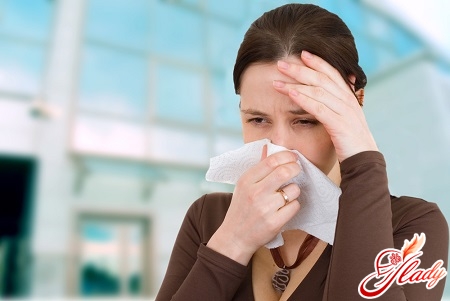 Drug allergy is commonly understood to meanallergic reactions to any medication. It is necessary to distinguish between a normal allergy to a medication (side effects) and symptoms of an obvious drug overdose that have absolutely nothing to do with allergic reactions. In such a case, it is very difficult to prescribe treatment without identifying the specific cause.
Drug allergy is commonly understood to meanallergic reactions to any medication. It is necessary to distinguish between a normal allergy to a medication (side effects) and symptoms of an obvious drug overdose that have absolutely nothing to do with allergic reactions. In such a case, it is very difficult to prescribe treatment without identifying the specific cause.
General about a drug allergy
A large number of people, noting the negativereaction to the drug, they immediately consider it an allergy, which is fundamentally wrong. Since the basis of an allergy to a drug in children and adults should be the mechanisms of developing insufficient tolerance to the drug, which is quite rare. By the way, this is why treatment should only be prescribed by a doctor. A drug allergy can appear only after repeated use of the drug, when it may already seem that our body tolerates it well enough. A drug allergy can occur in relation to different drugs, for example, to a vitamin complex that we have long been familiar with, aspirin or an antibiotic of the penicillin group. In this case, you will have to treat the disease with other means.
Is aspirin as dangerous?
People who prefer home treatment oftenFor headaches, only aspirin is taken. It is considered an important and popular medicine, but many people have intolerance to it, which is not a true allergic reaction. Salicylic acid, during its action on cells, can cause a so-called pseudo-allergic reaction. It is important to know that simple aspirin can cause a severe asthma attack, which is why asthmatics are not recommended to take medications containing salicylic acid in any form. Treatment is carried out with other drugs.
Antibiotics: be extremely careful!
According to statistics, the reaction to penicillinis experienced by about 5% of patients taking antibiotics containing it. In this case, fairly common symptoms are urticaria, eczema, and angioedema. But this is only a small list of what even the most innocent treatment for a cold can end up with. It is necessary to be very careful when taking this drug, since 1/10 of allergic reactions are a direct threat to the patient's life. When analyzing acute reactions to penicillin drugs, 70% of fatal cases were found due to anaphylaxis, while none of the patients ever suffered from this form of allergic reaction. One of the most dangerous ways to administer the drug is by injection. Checking the reaction to penicillin is usually done by skin tests. Only after you make sure that there is no allergy, you can begin treatment. What drugs belong to the penicillin series In any case, treatment should be carried out under the supervision and control of a doctor. He can say what drugs should be taken only after tests. The drugs included in the penicillin series include such drugs as amoxicillin, ampicillin, flucloxacillin, cloxacillin. It is very important to know that these drugs can have different names, for example, amoxin, augmentin, timentin, magnapen. In case of a reaction to at least one of the drugs, there is a risk that an allergy can also occur to all other drugs in this series. But do not despair ahead of time, since not all antibiotics lead to such consequences. Therefore, your doctor will certainly select a replacement, since patients with allergic reactions to the penicillin series may not experience identical symptoms at all during treatment with cephalosporins.
Drug allergy and symptoms
In most cases, drug allergymanifests itself in the form of urticaria, as well as Quincke's edema, in addition, anaphylactic shock may occur. The severity of the allergy can vary from minor manifestations, for example, in the form of urticaria on the hands to a rapid drop in blood pressure, which occurs during anaphylactic shock. If one of the symptoms appears, treatment is temporarily stopped.
What can cause a drug allergy?
Any treatment can lead to unpleasant side effects.consequences, including death. Any medication can cause an allergy, but among them, in addition to antibiotics and aspirin, the following can be distinguished:
- anti-inflammatory non-steroid drugs;
- radiocontrast agents;
- anesthetics;
- vaccines;
- ACE inhibitors.

How to Prevent Drug Allergy
First of all, you need to avoid taking thosemedications that cause an allergic reaction. Information about medications that you are allergic to should be recorded in a special notebook, the so-called "allergy passport". You should always provide your doctor with information about your food and drug allergies, even when it seems to you that some minor medications are not particularly related to the medications that cause your allergies.
How can I tell if you have a drug allergy?
In order to understand how exactly it manifests itselfallergy to drugs, it is necessary to study the mechanism of occurrence of this unpleasant disease. Allergy is essentially a certain reaction of the immune system to a drug that it does not trust. So, you started treatment of some disease. During the first contact with such a drug, the immune system may not react at all. In most cases, periodic or repeated intake of irritating drugs can lead to the manifestation of allergy. The immune system begins to remember them, recognize them and during each intake warn about the existing threat with quite unpleasant symptoms. This is such an interesting and unusual alarm system that lives inside any person. Do you or your loved ones have a drug allergy? Better make sure of it. If you notice similar symptoms, do not rush and make a diagnosis yourself. Allergy to drugs is a very insidious and rare phenomenon. Very often, malaise from a drug is only a side effect, which is always mentioned in the instructions for the drug. It is quite easy to cope with it, you just need to stop taking this drug. It may also be just a pseudo-allergic reaction, which is very similar to a drug allergy in many symptoms, but without a specific immune system reaction. But, both in the case of a real allergy and a pseudo-allergy, immediate medical intervention is required. Only a qualified allergist can make a final diagnosis and prescribe the necessary treatment.
How can one distinguish a false allergy from a real one?
This is quite possible, but only if you can carefully remember some details during which the disease manifested itself. Here are some useful tips that will help you with this:
- pseudo allergy occurs after the first administration of the drug, with the real allergy never. It is always preceded by an acquaintance of the body with the medicinal product;
- manifested only once, as a reaction toa certain medicine, a real allergy will manifest even during the reception of similar in composition analogues. In this case, a false allergy can manifest itself on various drugs;
- the present allergic reaction is very rare and earlier than 7 days after the start of the drug, but a false allergy manifests itself from several hours to 2 days.
Only an immunological test can give you a true answer to what is happening to you. Until you get the results, it is better to stop treatment with such drugs.
How to treat a medicinal allergy
How are allergies usually treated?In most cases, when a drug allergy occurs, the drug that caused the allergic reaction is simply discontinued and antihistamines (antiallergic) are prescribed. When it comes to pronounced manifestations of allergy, glucocorticoids and even adrenaline can be used for treatment.
What is the danger of allergic reactions?
Drug allergy is a problem that is quite commonrelevant for doctors. Since it is the doctor who bears full responsibility for the treatment, the prescription of a particular drug, and sometimes it is simply impossible to predict the occurrence of an allergic reaction in a person to a drug. Very often, patients independently take drugs that are systematically advertised on television, which are dispensed in pharmacy chains without a doctor's prescription. These are the drugs that pose the most serious danger. Reactions and complications during drug treatment
- Toxic, which arise when increasingthe recommended dose of the drug. Toxic reactions in most cases occur in patients with chronic diseases of the kidneys and liver, since the excess dose of the drug in these cases is due to inadequate removal of the drug from the body.
- Side effects are abdominal pain, headache andothers. You can see their list in the section of side effects of the drug in the instructions for its use. An example is a constant state of drowsiness after taking an antiallergic drug.
- Secondary effects are fungal infection of the mucous membranes, disturbance of the intestinal microflora and other.
- The withdrawal reaction, which appears after the cessation of prolonged treatment with certain medications.
- Allergic reactions.
Types of allergic reactions to drugs depending on the period of their manifestation

Varieties of drug allergies
Drug allergy inIn most cases, it becomes the main cause of severe allergic diseases, and a little less often of chronic diseases. Among them, the following stand out. Quincke's edema and urticaria, which are constantly itchy, disappearing when pressed, swollen red bumps that rise above the surface of the skin, with a diameter of 2 mm to 2 cm. These manifestations can persist from several hours to 2 days. Quincke's edema and urticaria can become chronic and manifest themselves over many years. Such diseases can also serve as evidence of more serious diseases, which is why it is not recommended to limit yourself to taking antihistamines alone, but it is recommended to undergo an examination in a specialized allergy center. Attacks of severe bronchial asthma, which are characterized by weakened and difficult breathing, anxiety, wheezing, can occur during the use of penicillin and a number of other antibiotics, local anesthetics, protein drugs, B vitamins, drugs containing acetylsalicylic acid. Allergic rhinitis – nasal congestion, scanty light discharge from the nasal passage. Quite often, allergic rhinitis is caused by taking medications that contain acetylsalicylic acid. Serum sickness, most often occurring after the administration of anti-diphtheria, anti-tetanus serums, and tetanus toxoid. Much less often, it can be caused by blood transfusions, the use of sulfonamides and antibiotics. The first symptoms of serum sickness most often occur on the 7-12th day after using the drug. In case of repeated administration of the serum, they can appear on the 1-5th day. In this case, there is an elevated body temperature of up to 39 degrees, rash, enlarged lymph nodes, swelling and pain in the joints, as well as abdominal pain. Allergic lesions of the skin most often manifest themselves as a rash. Its appearance can be provoked by barbiturates, sulfonamides, sedatives, aspirin, antibiotics. The rash can be either in the form of bumps or dots, or in the form of red spots. Such rashes last no more than 5 days after stopping the use of the drug that caused the allergy, and are accompanied by unpleasant itching. Anaphylactic shock is the most terrible and dangerous manifestation of allergy. In most cases, it can be provoked by antibiotics. In this case, vomiting and diarrhea are observed, the appearance of suffocation and bronchial spasm, decreased blood pressure, impaired cerebral circulation with subsequent pulmonary and cerebral edema. What should a specialist know to establish the cause of drug allergy? Only the attending physician can determine the cause of an unexpected allergic reaction, and he will need to know the answers to some questions:
- what manifestations were seen at the time of taking the drug;
- how much they were expressed;
- Whether there were changes in a place of introduction of a preparation;
- whether this medicine can cause a similar reaction, for this it is necessary to read the instruction on the use of the medicinal product;
- whether the occurrence of an allergic reaction depended on the dose of the preparation and on the mode of its administration;
- unusual manifestations were observed only with the first and / or repeated admission of the medication;
- Allergic diseases are present in the patient and his family members.
Rules for the prevention of allergies to medicines
Never take several at oncemedicines that have not been used before. Since in this case it will be very difficult to determine which drug could have caused an allergic reaction. If a new drug is prescribed, it is recommended to take ½ or ¼ of the prescribed dose per dose and monitor the body's reaction. What to do if an allergy occurs after the introduction or use of the drug?
Remember, your health and that of your family is in your hands! Therefore, be very careful when using new medications, and it is best to consult a doctor before taking them.









